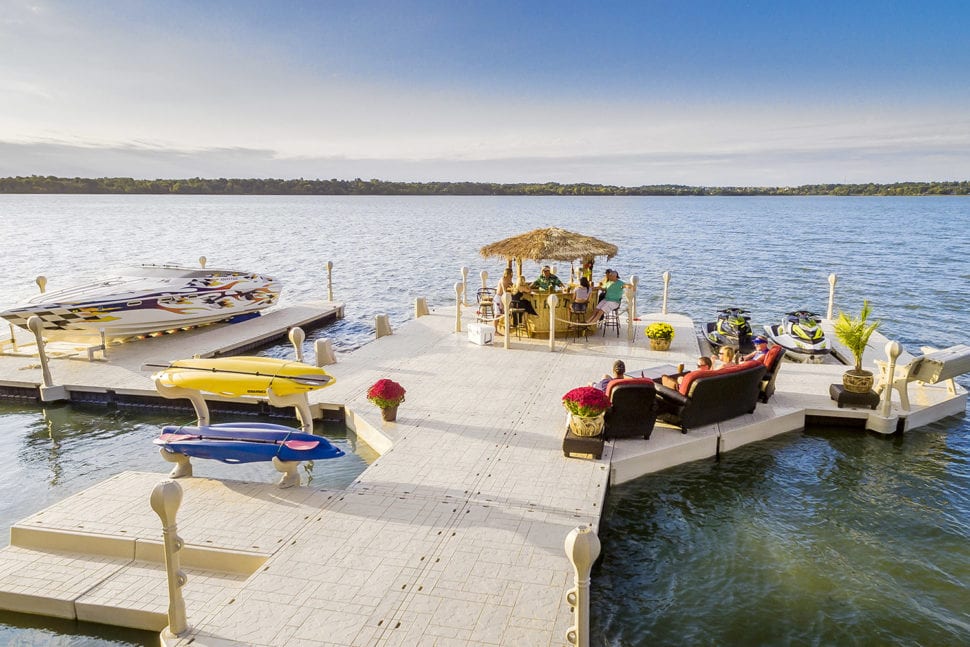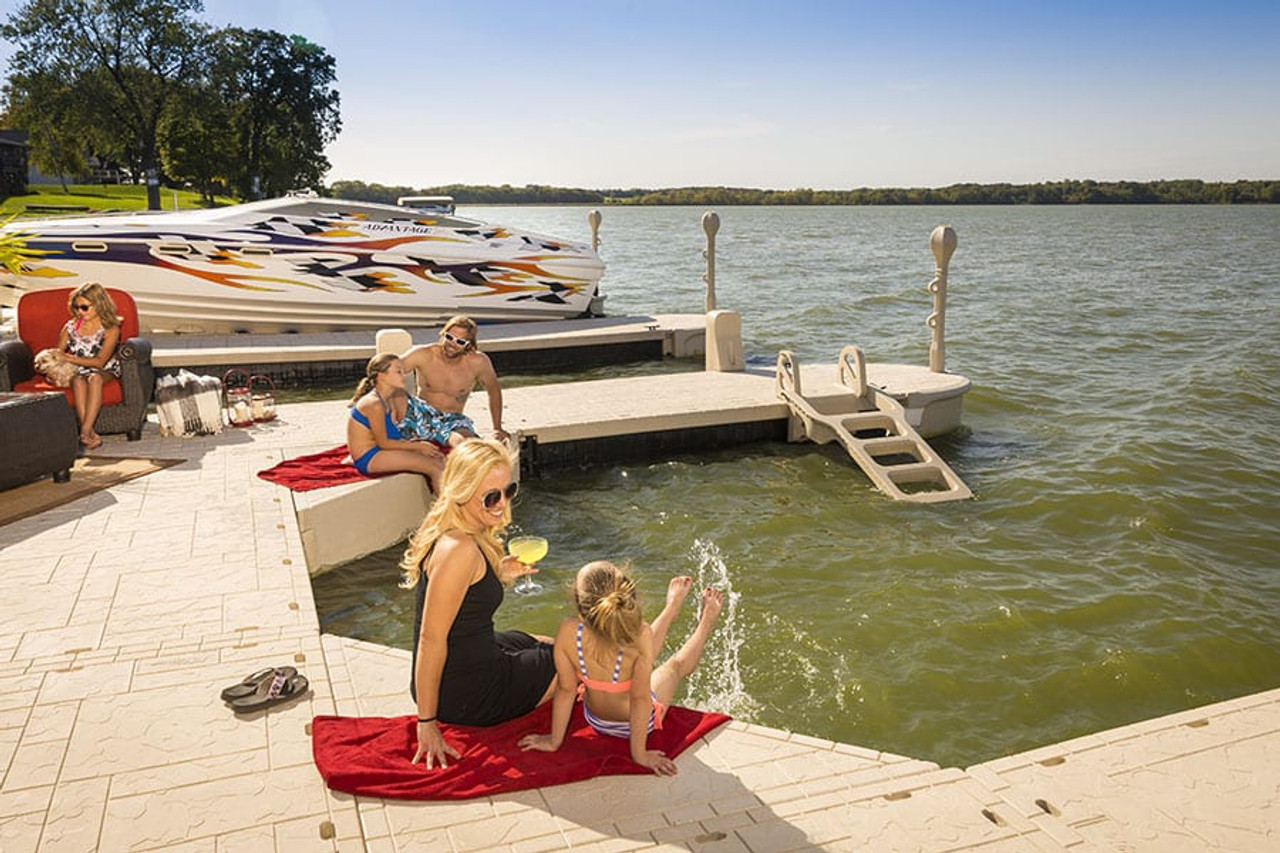The Ultimate Guide to Choosing the very best Floating Docks
Selecting the excellent floating dock needs a thorough understanding of various aspects that affect both performance and durability. Elements such as dock kinds, materials, and crucial functions dramatically affect your decision-making process.
Understanding Floating Dock Types
When picking a floating dock, it is vital to recognize the various kinds readily available, as each serves distinct objectives and applications. Floating docks mainly come under 3 categories: modular, fixed, and pontoon docks.
Modular docks are composed of private areas that can be conveniently constructed or reconfigured, making them perfect for changing water levels and varied uses, such as business procedures or leisure tasks. Their flexibility permits modification based on particular requirements.

Pontoon docks are identified by their buoyant framework, often made up of numerous pontoons that supply stability and assistance. They are especially well-suited for larger vessels and are generally utilized in marinas or for beachfront properties. Comprehending these types aids in picking one of the most appropriate floating dock to satisfy particular needs, guaranteeing optimum capability and security.
Secret Products for Sturdiness
Selecting the right products for floating docks considerably impacts their durability and longevity. The most common products include wood, plastic, steel, and composite materials, each offering distinctive advantages and limitations.
Wood, commonly preferred for its visual charm, requires routine upkeep to stand up to moisture and decay. Pressure-treated lumber can improve resistance to rot, but it might still be at risk to insects and weathering.

Plastic docks, constructed from high-density polyethylene (HDPE), are immune to corrosion, UV radiation, and impact, making them a preferred selection for seaside atmospheres. Their light-weight nature also facilitates very easy installment and relocation.
Steel docks, usually created from aluminum or galvanized steel, give exceptional strength and longevity. They are immune to rust, especially when treated, but might call for additional insulation to avoid heat accumulation in warm environments.
Composite products, incorporating timber fibers and plastics, supply the benefits of both timber and plastic, standing up to dampness and fading while requiring very little upkeep. - floating dock services
Eventually, the choice of products ought to line up with ecological problems, planned use, and upkeep choices to make certain the floating dock stays useful and cosmetically pleasing over time.
Necessary Functions to Think About
While the option of materials is important, taking into consideration vital attributes for floating docks is equally crucial to ensure optimal performance and customer contentment. One key feature to analyze is the dock's buoyancy capability, which identifies just how much weight it can support without immersing. dock company. This is essential for suiting watercrafts, individual boat, and even recreational activities
Furthermore, transportability is a considerable consideration. Depending upon your requirements, you may desire a dock that is easy to disassemble and transfer, see it here especially if you prepare to relocate it seasonally. Security is one more important feature; a properly designed floating dock ought to lessen motion triggered by wind and water currents, offering a safe platform for users.
Safety features, such as non-slip surfaces and rounded edges, are additionally important to avoid crashes, specifically in wet problems. Additionally, take into consideration the accessibility of accessories, such as bumpers, cleats, and ladders, which can improve the capability of your dock.
Installment and Maintenance Tips
Establishing and preserving a drifting dock needs cautious planning and attention to information to guarantee its durability and optimal performance. Begin by picking a proper area that reduces exposure to solid currents and waves, which can trigger deterioration. Make sure that the water deepness suffices for the dock's elevation which it is secured securely to stop motion.
Throughout installment, adhere to the manufacturer's guidelines carefully, as incorrect setting up can jeopardize security. Usage high-grade materials resistant to corrosion, such as aluminum or dealt with timber, to improve sturdiness. On a regular basis check all elements, including floats, ports, and anchoring systems, for indications of damages or wear.
If your dock makes use of flotation gadgets, ensure they continue to be undamaged and free from leaks. By adhering to these setup and maintenance pointers, you can delight in a trusted and useful floating dock for years to come.
Budgeting for Your Dock
Budgeting for your dock is a critical action that can substantially affect your general contentment and investment in a beachfront residential property. Establishing a clear budget helps you navigate the different alternatives readily available and ensures you make informed choices that align with your monetary capacities.
Begin by determining the size and design of the dock you need, as these variables will substantially influence the expense. Floating docks can vary dramatically in cost, depending upon materials, buoyancy, and functions like ramps and devices. Study Get More Info various suppliers and distributors to compare costs and comprehend the marketplace worth.
Along with preliminary costs, take into consideration recurring costs such as maintenance, insurance, and prospective fixings. Assign funds for these repeating costs to avoid surprises down the line. It's also sensible to allocate any essential licenses or inspections, which might be required by neighborhood guidelines.
Lastly, keep in mind the possible return on financial investment. A tactical dock can enhance your home's value and appeal, offering a favorable economic influence in the long-term. By budgeting efficiently, you can ensure that your dock meets your requirements without endangering your financial security.
Verdict
Finally, choosing the suitable floating dock demands a detailed assessment of numerous elements, consisting of dock like this types, products, essential features, and setup processes. Prioritizing durability and conformity with regional regulations inevitably boosts performance and residential or commercial property worth. Careful consideration of budgetary constraints will certainly even more make certain a sound financial investment. By adhering to these guidelines, people can make enlightened decisions that advertise long-lasting fulfillment and use in marine atmospheres.

While the option of products is critical, considering essential features for floating docks is just as important to make sure optimum efficiency and individual complete satisfaction.Establishing up and maintaining a floating dock needs mindful preparation and attention to detail to ensure its durability and optimal efficiency. Floating docks can vary dramatically in rate, depending on products, buoyancy, and attributes like ramps and accessories.In conclusion, selecting the perfect floating dock demands a complete evaluation of different variables, consisting of dock kinds, materials, vital features, and setup procedures.